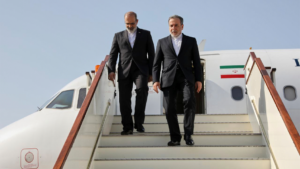President Isaac Herzog met last week with Jordanian King Abdullah II in his palace in Amman, where the two discussed possible collaboration on energy, the economy, agriculture and the climate crisis.
Following the meeting – the first between the two leaders since Herzog became president – Herzog said: “Jordan is a very important country. I greatly respect King Abdullah, a great leader and a significant regional player who has recently met with very important leaders, among them President Biden, President Putin, President Sissi and Abu Mazen [Palestinian Authority President Mahmoud Abbas].”
At the meeting, which Herzog described as warm, the President said the two discussed an agreement for Jordan to import agricultural produce to Israel during the upcoming shmita year – when observant Jews do not cultivate their land – as well as cooperations in the fields of energy, sustainability and the climate that the two countries can promote together.
Since taking office, Herzog has proven to be a significant figure in promoting Israel’s foreign affairs. He has taken part in unusual talks with additional leaders in the region who have unstable ties with Israel, such as Turkish President Recep Tayyip Erdogan and Palestinian Authority President Mahmoud Abbas, and received a warm letter from Moroccan King Mohammed VI. The latter wrote in his letter: “I am very satisfied with the steps taken to renew ties between our countries. I believe that we will make this momentum sustainable to promote the chance for peace among all nations in the region.”
Jordan’s King Abdullah II, Egyptian President Abdel Fattah al-Sissi and Palestinian President Mahmoud Abbas at the Ittihadiya presidential palace in Cairo, Egypt, this week. Palestinian President Office/
According to President Herzog, “There is a sense in the region of a desire to move forward, a desire to talk. We are now marking a year since the Abraham Accords were signed. They are very important agreements that change the region and its dialogue. I speak to many leaders throughout the world, almost every day, in full coordination with the Israeli government, and I intend to talk and meet with other heads of state from the region. I think that it is very important for Israel’s strategic and diplomatic interests to engage in dialogue with everyone.”
When Foreign Minister Yair Lapid took office he declared his intention for the new government to promote and strengthen ties between Jordan and Israel. In recent years, alongside close security cooperation, Israel’s relationship with Jordan declined significantly: Due to the Palestinian majority in Jordan and hostile public opinion there, Jordan evinced a hardline policy toward the Israeli government over the Temple Mount and the Sheikh Jarrah neighborhood in East Jerusalem, as well as sharply and publicly criticizing Israel’s actions in the May operation in Gaza.
As part of the efforts to improve ties, Lapid went to Jordan in July, where he met with his Jordanian counterpart Ayman Safadi, during which the two agreed on a number of collaborative projects. Among other things, it was agreed that Jordan would increase its export potential to the West Bank from some $160 million to about $700 million, in keeping with the Paris Protocol which provides the economic framework for trade between Israel and the Palestinian Authority.
Jordan’s king tells Abbas, Sissi ‘no regional stability without a two-state solution’
A year after normalization accord, first Bahraini ambassador arrives in Israel
Jordan King’s loosening grip
Another reason for tensions between the two countries was Israel’s decision to back out of the Red Sea-Dead Sea canal project, which was to help Jordan deal with its severe water shortage. “This project is not economically feasible, but Israel is now seeking a number of alternative solutions to help Jordan,” a diplomatic official told Haaretz. Lapid’s declaration that Israel would sell another 50 million cubic meters of water to Jordan signals that Israel intends to increase its assistance to Jordan in facing its water shortage.
The meeting between Herzog and Abdullah took place about two months after newly minted Prime Minister Naftali Bennett met in secret with the king, and following years of tension between him and former Prime Minister Benjamin Netanyahu. One of the most serious public clashes between Israel and Jordan occurred in March, when a planned visit to the Temple Mount by the Jordanian crown prince was canceled because of a dispute over security arrangements. In response, Jordan did not allow Netanyahu’s plane to cross its airspace on its way to the UAE. Netanyahu subsequently ordered the closure of Israel’s airspace to Jordanian flights.





